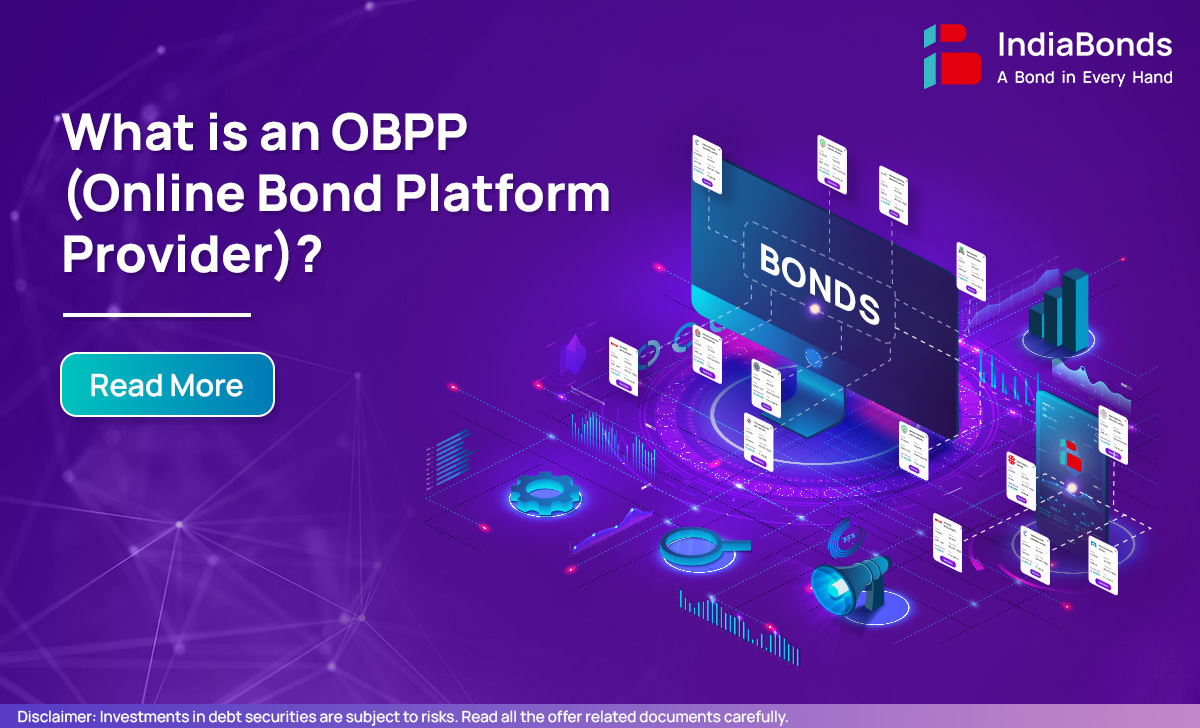What is an OBPP (Online Bond Platform Provider)?

Introduction
Over the last decade, the financial landscape in India has undergone a significant digital transformation, resulting in a revolution of traditional investment avenues through technological advancements. One such innovation is the emergence of Online Bond Platform Providers (OBPPs), which have democratized bond trading by offering investors convenient and accessible online platforms. In the past 2-3 years, the Indian debt market has undergone a significant transformation due to the entry of fintech players. Previously, institutional participants dominated the market, resulting in a lack of investor-centric innovations and technological integration. However, recognizing the untapped potential of India’s fixed-income sector and the growing interest in bonds among non-institutional investors, these fintech players have revolutionized the market.
This revolution has not only brought about a change in dynamics but also introduced new ideas and approaches to the industry. The infusion of technology and innovative solutions has opened up opportunities for a broader range of investors, creating a more inclusive and accessible debt market in India. In this article, we will explore the concept of OBPPs, their role in the financial sector and the benefits they bring to both investors and issuers.
What is an OBPP?
An OBPP is a SEBI-registered Online Bond Platform Provider that facilitates the buying and selling of bonds. These platforms act as intermediaries, providing investors with bond investment choices and enabling seamless bond transactions. OBPPs leverage technology to simplify the bond investment process, making it more accessible and efficient for non-institutional investors. They create an online ecosystem and provide comprehensive information about bonds. Investors can now browse through a diverse array of bonds, review their features, their credit ratings, interest rates, maturities and offer documents. They can compare different bonds and assess their risk-return profiles, empowering them to make well-informed investment choices.
Retail Participation in Bonds
In 2012, government agencies launched tax-free bonds with attractive yields and a tax-saving component, which received a favorable response from the retail investors. The participation of non-institutional investors in bonds begins here which was also aligned perfectly with the low-interest regime. This timing was ideal as the interest rates on conventional fixed-income products like bank fixed deposits significantly declined over the next few years. During that period, the allure of a 9-12% post-tax annual return became increasingly attractive compared to the 5-6% offered by bank FDs. Many companies issued bonds during this time, resulting in significant participation from retail investors. However, the secondary market lacked depth. As a result, many brokerage and security houses quickly took advantage of the opportunity to establish a robust presence and further develop the fixed-income market.
With the uptick in fintech in India, technological platforms started coming up offering bonds to investors. Nevertheless, there were instances where online bond platforms offered investments based on unlisted debt securities, presenting alternative investment opportunities in a similar manner to traditional debt offerings. Also, information and risks of these offerings were often not complete outside the regulated mechanism, orders were being settled bilaterally and riskier bonds were perhaps inappropriately marketed as fixed deposit (FD) alternatives. In addition, the absence of an investor grievance mechanism raised significant concerns due to the lack of formal regulation. Nevertheless, SEBI intervened to tackle this problem.
In November 2022, the SEBI brought OBPPs under its purview by implementing a regulatory framework to ensure the long-term growth and success of India’s bond market. This move aimed to protect investor interests and establish trust in the system, setting a solid foundation for the market’s development.
A Glimpse of the Framework for OBPPs
- In order to operate, OBPPs must first register with SEBI as Stock Brokers specifically under the debt segment of the Stock Exchanges and subsequently get an OBPP license
- To ensure customer satisfaction and effective grievance resolution, OBPPs should obtain authentication from SEBI Complaints Redress System (SCORES) and establish a well-defined mechanism to proactively handle any grievances that may arise during their operations.
- The Know Your Customer (KYC) process will be streamlined to comply with SEBI’s requirements, making it mandatory for platforms to ensure compliance.
- OBPPs are only allowed to showcase bonds that are listed, to be listed or issued by the government. They are prohibited from showcasing unlisted debt securities on their platforms.
- OBPPs are required to route all orders through the Request for Quote platform (RFQ) of recognized Stock Exchanges. This measure aims to ensure transparency and seamless execution of orders.
- All OBPPs must ensure that orders are routed and settled through the stock exchange mechanism (i.e. ICCL/NSCCL).
- OBPPs are not to offer any other financial security except bonds
SEBI’s regulations have compelled OBPPs to implement stricter checks, enhance operational transparency, mitigate payment and settlement risks, provide thorough disclosures to investors and establish a robust grievance redressal system.




How does an OBPP operate?
OBPPs today primarily offer listed bonds that are considered safer. To open an account on an OBPP, individuals must have an active demat account. Sign up and comply with the KYC norms of any OBPP. It is important to note that OBPPs do not handle investor funds directly. When investing in bonds through OBPPs, the investment amount needs to be transferred to the bank account of ICCL/NSCCL, which are the settlement authorities. Once the transfer is completed, the purchased bond units are transferred to the demat account. Interest payments from the bonds are directly credited to the investor’s bank account by the issuer. Upon maturity, the bond’s face value is also credited to the bank account. Essentially, OBPPs are responsible for overseeing this complete bond investment process, which includes handling KYC procedures and facilitating the exchange of money and bond units which is done directly between the customer and national clearing houses.
OBPPs provide detailed pages for each bond, presenting comprehensive information and product notes. Some platforms offer a diverse range of bond options, including bond public issues, private placements, AAA to A rated, G-Secs, SDLs, SGBs and PSU bonds, etc. IndiaBonds also curates bond packs, featuring high-yielding bonds, state-guaranteed bonds, bank bonds, tax-free bonds, PSU bonds, G-Sec/SDL and monthly income bonds.
Buyers Beware
Investing directly in bonds on exchanges or through platforms can be challenging, especially for beginners. It is important to note that pursuing higher returns may involve taking on greater risks, such as lower-rated bonds or complex instruments like unsecured or callable bonds. Some platforms focus only on high-yielding bonds, while others prioritize ratings. However, IndiaBonds stands out by presenting complete bond offerings from government securities to mostly up to A rated bonds. Investors must diligently research before investing in bonds. OBPPs only serve as intermediaries or aggregators and are not responsible for any sub-optimal investment outcomes.
Conclusion
OBPPs enhance the bond offerings by curating and presenting them with professional knowledge, ensuring better selection and organization. Moreover, these platforms provide convenient access to information, making bond buying more user-friendly. Additionally, OBPPs contribute to investor education and awareness, helping individuals become more informed participants in the bond market, thereby improving the overall level of investor knowledge. OBPPs have transformed the bond market in India, offering increased accessibility, transparency and efficiency to investors. These platforms have empowered retail investors, enabling them to participate in bond investing and access opportunities previously available only to institutional investors. As OBPPs continue to advance, they will play a crucial role in shaping the future of the Indian bond market, strengthening its infrastructure and contributing to overall economic growth.
FAQs
Q. What are ICCL and NSCCL?
A. ICCL (Indian Clearing Corporation Limited) and NSCCL (National Securities Clearing Corporation Limited) are prominent entities in the Indian financial market that provide clearing and settlement services for equity and equity derivatives. ICCL is a subsidiary of the BSE and serves as the clearing corporation for trades executed on the BSE, while NSCCL, a subsidiary of the NSE, performs the same function for trades executed on the NSE. Both ICCL and NSCCL play a vital role in mitigating the risks involved in settlements thereby ensuring the smooth functioning, stability and integrity of the Indian stock exchanges.
Q. What is the impact of OBPPs on the Indian Bond Market?
1. Increased Market Efficiency
OBPPs streamline bond market operations, reducing transaction times and paperwork, leading to a more vibrant and liquid market.
2. Widening Investor Base
OBPPs attract retail investors, enabling easy participation and contributing to the market’s deepening.
3. Encouraging Issuer Diversity
OBPPs allow issuers, including SMEs, to access a larger investor base, promoting inclusivity and diversity in the bond market ecosystem.
4. Fostering Financial Inclusion
OBPPs promote financial inclusion by providing individuals from remote areas with access to bond investments, supporting the government’s goal of a more financially inclusive India.
Disclaimer: Investments in debt securities/ municipal debt securities/ securitised debt instruments are subject to risks including delay and/ or default in payment. Read all the offer related documents carefully.













































